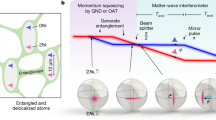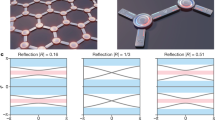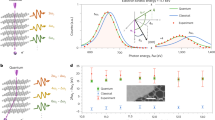Abstract
IN his address on the decline of determinism,1 Sir Arthur Eddington enunciates a very curious equation. “If the atom has indeterminacy, surely the human mind will have equal indeterminacy: for we can scarcely accept a theory which makes out the mind to be more mechanistic than the atom.” This statement will not bear too close an examination even from a non-quantitative point of view. Thus an attempt by myself to solve even a simple wave equation might lead to any of a large number of results; a similar attempt by Sir Arthur Eddington would lead to the correct solution with a high degree of probability. I do not think that this proves that his mind is more mechanistic than my own, whatever that may mean. Actually it is generally regarded as a compliment to describe a person as reliable, that is, to suggest that his conduct is predictable.
This is a preview of subscription content, access via your institution
Access options
Subscribe to this journal
Receive 51 print issues and online access
$199.00 per year
only $3.90 per issue
Buy this article
- Purchase on SpringerLink
- Instant access to the full article PDF.
USD 39.95
Prices may be subject to local taxes which are calculated during checkout
Similar content being viewed by others
References
NATURE, 129, 240; Feb. 13, 1932.
"Crime as Destiny", 1931.
Author information
Authors and Affiliations
Rights and permissions
About this article
Cite this article
HALDANE, J. Determinism. Nature 129, 315–316 (1932). https://doi.org/10.1038/129315b0
Published:
Issue date:
DOI: https://doi.org/10.1038/129315b0
This article is cited by
-
Intensity Ratio of Fluorescent X-Ray Lines
Nature (1932)



